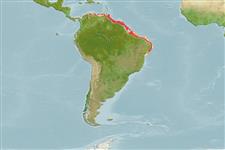Environment: milieu / climate zone / depth range / distribution range
Ecologia
marinhas associadas(os) a recifes; intervalo de profundidade 0 - 70 m (Ref. 13608). Tropical; 12°N - 13°S, 82°W - 34°W
Western Atlantic: Panama to Brazil.
Tamanho / Peso / Idade
Maturity: Lm ? range ? - ? cm
Max length : 40.0 cm TL macho/indeterminado; (Ref. 5217); common length : 25.0 cm TL macho/indeterminado; (Ref. 5217); peso máx. Publicado: 1.2 kg (Ref. 5217)
Espinhos dorsais (total) : 3; Raios dorsais moles (total) : 29; Espinhos anais: 0; Raios anais moles: 23 - 25; Vértebras: 36 - 38. Head depressed, trunk compressed; molariform teeth on both jaws; no venomous gland on any spine; body brownish dorsally with black diffuse mottlings, pale ventrally; lateral line pores distinct with white spots; fin membranes black distally (Ref. 13608).
Inhabits littoral (subtidal) waters; usually found on sandy or rock bottom; large fish may be found in waters less than 1 m of depth hiding in crevices or caves (Ref. 3273). Feeds mostly on molluscs and crustaceans. Reported to be moderately abundant and regularly consumed by fishermen (Ref. 50841). Eggs are deposited on the shells of mollusks and on stones. One of the very few marine fishes that guards fry and juveniles. It is caught in traps and special types of hooks (garrapinos) (Ref. 50841). Marketed fresh.
One of the few marine fishes that provide posthatching care. Males actively guard free-swimming juveniles in burrows (Ref. 13442, 101618). Males may mate more than once a year (Ref. 101618).
Collette, B.B., 1978. Batrachoididae. In W. Fischer (ed.) FAO species identification sheets for fishery purposes. West Atlantic (Fishing Area 31), Volume 1. FAO, Rome. (Ref. 3273)
Categoria na Lista Vermelha da IUCN (Ref. 130435)
Ameaça para o homem
Harmless
Utilização humana
Pescarias: pouco comercial
Ferramentas
Relatórios especiais
Descarregue XML
Fontes da internet
Estimates based on models
Preferred temperature (Ref.
123201): 26.9 - 28, mean 27.5 °C (based on 130 cells).
Phylogenetic diversity index (Ref.
82804): PD
50 = 0.7500 [Uniqueness, from 0.5 = low to 2.0 = high].
Bayesian length-weight: a=0.00389 (0.00180 - 0.00842), b=3.12 (2.94 - 3.30), in cm total length, based on all LWR estimates for this body shape (Ref.
93245).
Nível Trófico (Ref.
69278): 3.8 ±0.0 se; based on diet studies.
Resiliência (Ref.
120179): Médio, tempo mínimo de duplicação da população 1,4 - 4,4 anos (Preliminary K or Fecundity.).
Fishing Vulnerability (Ref.
59153): Low to moderate vulnerability (30 of 100).
Nutrients (Ref.
124155): Calcium = 44.5 [24.7, 81.6] mg/100g; Iron = 0.492 [0.297, 0.979] mg/100g; Protein = 18 [17, 19] %; Omega3 = 0.108 [0.064, 0.188] g/100g; Selenium = 38.2 [20.3, 75.6] μg/100g; VitaminA = 99.4 [33.8, 276.0] μg/100g; Zinc = 1.17 [0.82, 1.61] mg/100g (wet weight);
